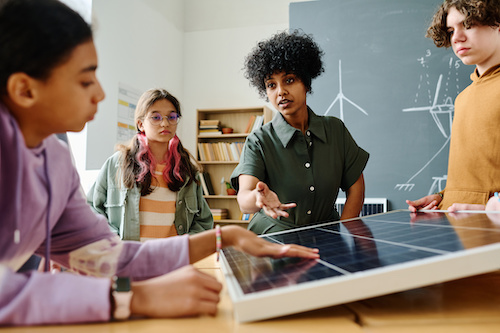Key points:
- Innovation and access are two major learning trends in 2024
- Learn more about K-12 Tech Innovation News
- Discover Current Trends in Education
In 2024, K-12 learning experiences are evolving rapidly, shaped by technological advancements and educational paradigms.
Personalized learning gains momentum as AI-driven adaptive platforms cater to individual student needs, fostering a more customized educational journey. Virtual and augmented reality technologies immerse students in interactive, dynamic lessons, enhancing engagement and comprehension. Collaborative online platforms facilitate global connections, fostering cultural awareness and diverse perspectives. Additionally, emphasis on critical thinking, creativity, and problem-solving skills takes precedence, preparing students for a rapidly changing future.
As educators and policymakers strive for inclusivity and accessibility, K-12 tech innovation news coverage in 2024 makes it clear that embracing innovation, connectivity, and a holistic approach to education are essential.
What are the trends in learning in 2024?
Current trends in education in 2024 suggest a continued emphasis on personalized and adaptive learning models. Artificial intelligence will play a pivotal role, with adaptive platforms tailoring instruction to individual student needs. Hybrid learning models, blending in-person and online elements, will likely persist, offering flexibility and resilience in the face of disruptions.
Digital literacy and coding education will gain prominence, equipping students with essential 21st-century skills. Augmented and virtual reality applications may see increased integration, providing immersive and interactive learning experiences. Social-emotional learning will remain a focal point, addressing students’ well-being and interpersonal skills.
Collaborative and project-based learning approaches will continue to foster critical thinking and creativity. Data analytics will be utilized for informed decision-making, offering insights into student progress. However, challenges such as addressing the digital divide and ensuring equitable access to technology will remain priorities in shaping the evolving landscape of K-12 education in 2024.
What are the learning and development trends for 2024?
K-12 learning and development trends in 2024 are poised for significant shifts. Personalized learning experiences will be further refined through adaptive technologies, tailoring education to individual student needs. Hybrid learning models, combining in-person and virtual elements, will continue to offer flexibility and resilience. Increased emphasis on digital literacy and coding education will prepare students for an evolving workforce.
Social-emotional learning will be prioritized, acknowledging the importance of holistic student development. Augmented and virtual reality applications will provide immersive, hands-on learning experiences, fostering deeper understanding. Collaborative and project-based learning approaches will continue to promote critical thinking and teamwork.
Furthermore, the integration of data analytics will enable educators to make data-informed decisions, enhancing instructional strategies. Addressing the digital divide and ensuring equitable access to technology will remain focal points in creating inclusive and adaptive learning environments for students in 2024.
What is the future of learning and development
As we look at current trends and issues in education, the future of K-12 learning and development is poised for dynamic transformation. Personalized learning, driven by artificial intelligence and adaptive technologies, will cater to individual student needs, fostering a more customized educational experience. Hybrid learning models, combining in-person and virtual elements, will become integral, offering flexibility and resilience in education delivery.
Digital literacy and coding education will be paramount, preparing students for an increasingly technology-driven world. Augmented and virtual reality applications will revolutionize learning experiences, providing immersive and interactive educational content. Social-emotional learning will take center stage, emphasizing holistic student development and well-being.
Collaborative and project-based learning approaches will continue to promote critical thinking and collaboration skills. Data analytics will play a pivotal role in informing instructional decisions and tracking student progress. The future of K-12 learning envisions a holistic, adaptive, and technologically enriched educational landscape, equipping students with the skills and knowledge necessary for success in the 21st century.
What are the 8 trends in education technology that will have a major impact in 2024?
In 2024, eight key trends and new innovations in education technology are poised to make a significant impact.
Adaptive learning platforms, driven by artificial intelligence, will personalize instruction, catering to individual student needs.
Hybrid learning models, blending in-person and online elements, will continue to offer flexibility and resilience.
Augmented and virtual reality applications will enhance immersive learning experiences, making complex subjects tangible.
Digital literacy and coding education will gain prominence, preparing students for the demands of a technology-centric future.
Learning analytics will provide valuable insights, enabling educators to make data-informed decisions and enhance instructional strategies.
Cybersecurity education will address the importance of responsible digital citizenship.
Collaborative tools and project-based learning approaches will foster critical thinking and collaboration skills.
Addressing the digital divide and ensuring equitable access to technology will remain paramount in shaping the transformative landscape of K-12 education technology in 2024.
Conclusion
The evolving landscape of K-12 education in 2024 reflects a commitment to personalized, tech-driven, and collaborative learning. These trends emphasize adaptability, critical thinking, and global connectivity, fostering a holistic approach to education that equips students with the skills needed for success in an ever-changing world.
- Friday 5: Virtual field trips - April 26, 2024
- Google, MIT RAISE launch no-cost AI training course for teachers - April 26, 2024
- 4 ways to support work-based learning - April 23, 2024

